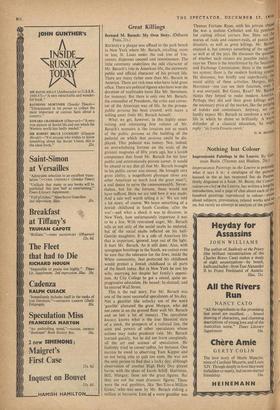Great Killings
RECENTLY a plaque was affixed to the park bench in New York where Mr. Baruch, recalling, more or less, St. Louis under the oak tree of Vin- cennes, dispenses counsel and reminiscence. The little ceremony underlines the odd character of Mr. Baruch's role in American life, the extremely public and official character of his private life. There are many richer men than Mr. Baruch in America. There are rich men who have held great office. There are political figures who have won the devotion of multitudes (men like Mr. Stevenson, for instance). But there is only one Mr. Baruch, the counsellor of Presidents, the critic and correc- tor of the American way of life. So the private- public persona has been created, with many a willing assist from Mr. Baruch himself.
What we get, however, in this highly enter- taining and interesting first volume of Mr. Baruch's memoirs is the 'creation not so much of the public persona as the building of the pedestal on which that persona could be dis- played. That pedestal was money. Not, indeed, an overwhelming fortune on the scale of the greatest magnates of fifty years ago, but a lavish competence that freed Mr. Baruch for his later public and ostentatiously private career. It would be absurd to say that all that Mr. Baruch brought to his public career was money. He brought very great ability, a magnificent physique (does any other American so much look the great man?), a real desire to serve the commonwealth. Never- theless, but for the fortune, these would not have sufficed. Here we are told how it was made. And a tale well worth telling it is! We are told a lot more, of course. We learn something of a Jewish childhood in South Carolina 'after the war'—and what a shock it was to discover, in New York, how unfortunately important it was to be a Jew. With restrained anger, Mr. Baruch tells us not only of the social snubs he endured, but of the social snubs inflicted on his half- Gentile daughters. It is a side of American life that is important, ignored, kept out of the light. It hurt Mr. Baruch. As it still does. Alas, with synagogue bombings in the South, we cannot even be sure that the tolerance for the Jews, inside the White community, that protected his childhood would protect a Jewish childhood in all parts of the South today. But in New York he met his wife, marrying her despite her family's opposi- tion. At City College he got a sound, quite un- progressive education. He boxed; he Aanced; and he entered Wall Street.
This is the real story. For Mr. Baruch was one of the most successful speculators of his day. Not a gambler (the unlucky use of the word 'gamble' alienated the great Morgan, who did not come in on the ground floor with Mr. Baruch and so lost A lot of money). The speculator knows; knows what is the true financial state of a stock, the prospects of a railroad line, the aims and powers of other speculators whose actions may make prudence vain. Mr. Baruch learned quickly, but he did not learn completely, all the art and science of speculation. He foolishly tried to corner coffee, for instance. One success he owed to observing Yom Kippur and so not being able to quit too soon. He was not the only person to find that a lucky day, although observation of another High Holy Day played havoc with the plans of Jacob Schiff. Harriman. Hill, Morgan; these are the great figures. But they are not the most dramatic figures. Those were the real gamblers, like 'Bet-You-a-Million Gates,' who' was seen by Mr. Baruch risking a million at baccarat. Less a a mere gambler was Thomas Fortune Ryan, with his private chaPel (he was a zealous Catholic) and his penchant for cutting ethical corners fine. Here are the stories of raids and counter-raids, of panics and disasters, as well as great killings. Mr. Baruch enjoyed it, but conveys something of the agonies as well as of the joys. He discusses the question of whether such careers are possible today. Hs says no. There is the interference by the Securities and Exchange Commission; there is the modern tax system; there is the modern banking system. He discusses„ but briefly and superficially, th:s social utility of these activities. Morgan, 01.1; Harriman—one can see their function, even n it was overpaid. But Gates, Ryan? Mr. Baruch thinks they helped to make modern America. Perhaps they did and their great killings Were the necessary price of the market, like the purging of kulaks and commissars. Anyway, we cal hardly expect Mn Baruch to condemn a way °` life in which he shone so brilliantly. A wall'', defender of a classical education, he reply : 'sic f ortis Etruria crevi I.' D. W. Bit0a4






































 Previous page
Previous page